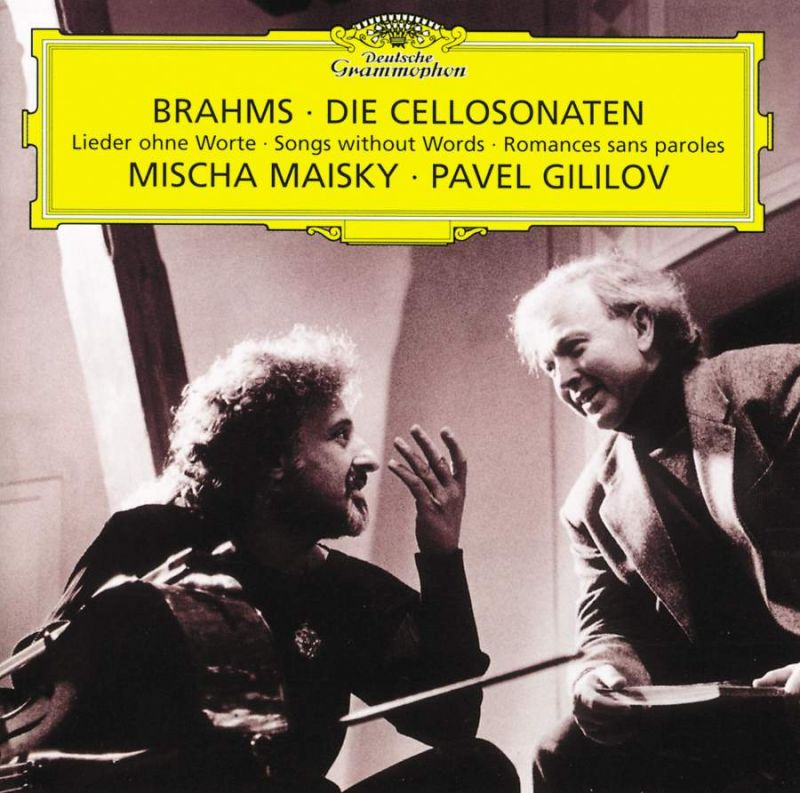Brahms Cello Sonatas; Songs Without Words
View record and artist detailsRecord and Artist Details
Composer or Director: Johannes Brahms
Label: Deutsche Grammophon
Magazine Review Date: 10/1999
Media Format: CD or Download
Media Runtime: 80
Mastering:
DDD
Catalogue Number: 459 677-2GH

Tracks:
| Composition | Artist Credit |
|---|---|
| Sonata for Cello and Piano No. 1 |
Johannes Brahms, Composer
Johannes Brahms, Composer Mischa Maisky, Cello Pavel Gililov, Piano |
| Sonata for Cello and Piano No. 2 |
Johannes Brahms, Composer
Johannes Brahms, Composer Mischa Maisky, Cello Pavel Gililov, Piano |
| (4) Lieder, Movement: No. 2, Die Mainacht (wds. Hölty) |
Johannes Brahms, Composer
Johannes Brahms, Composer Mischa Maisky, Cello Pavel Gililov, Piano |
| (5) Lieder, Movement: No. 5, Minnelied (wds. Hölty) |
Johannes Brahms, Composer
Johannes Brahms, Composer Mischa Maisky, Cello Pavel Gililov, Piano |
| (6) Lieder, Movement: No. 1, Sommerabend (wds. Heine) |
Johannes Brahms, Composer
Johannes Brahms, Composer Mischa Maisky, Cello Pavel Gililov, Piano |
| (6) Lieder, Movement: No. 2, Mondenschein (wds. Heine) |
Johannes Brahms, Composer
Johannes Brahms, Composer Mischa Maisky, Cello Pavel Gililov, Piano |
| (6) Lieder, Movement: No. 2, Feldeinsamkeit (wds. Allmers) |
Johannes Brahms, Composer
Johannes Brahms, Composer Mischa Maisky, Cello Pavel Gililov, Piano |
| (6) Lieder, Movement: No. 3, Nachtwandler (wds. Kalbeck) |
Johannes Brahms, Composer
Johannes Brahms, Composer Mischa Maisky, Cello Pavel Gililov, Piano |
| (4) Lieder, Movement: Der Tod, das ist die kühle Nacht (wds. Heine) |
Johannes Brahms, Composer
Johannes Brahms, Composer Mischa Maisky, Cello Pavel Gililov, Piano |
Author:
The very opening of the E minor Sonata gives the clue as to what is in store. Maisky’s tone is veiled and gentle, and his phrasing affectingly poetic – especially at 0'40'', where the winding melody line makes way for Pavel Gililov to take over the principal theme. Track forward to 4'03'', and sample the same passage in the repeat (not in itself a common occurrence in performances of this sonata), and the approach is more forthright, appropriately so given the more dramatic incidence that the development section has in store. Maisky holds the line with great skill, especially considering that both he and Gililov favour a fair degree of expressive rubato throughout (try the quietly broadened opening of the first movement’s recapitulation, from 9'28''). The second movement is conversational and lightly pointed, with a tripping second set, and I loved the way the cello races ahead at 3'40'' into the finale, beckoning the pianist to respond.
The opening movement of the F major Sonata is truly Allegro vivace and the pizzicatos that open the Adagio affetuoso slow movement set in at a brisk pace, with the tempo broadening only when the main melody line enters. Maisky’s athletic approach follows through to the last two movements, though the Allegro passionato’s Trio is very lyrical.
Which leaves the group of ‘songs without words’ (Maisky’s second series based on Brahms – the first was reviewed in 11/97), which work best where the melody line has an instrumental quality, as in Minnelied, for example, and could easily serve as one of Brahms’s lyrical second subjects. Feldeinsamkeit andDer Tod, das ist die kuhle Nacht respond equally well to Maisky’s confidential manner of playing, but a Lied like Die Mainacht – with its aching crescendos – cries out for the presence of a human voice. Otherwise, all goes well and the sonata performances are recommendable.
Good alternative CD versions of the sonatas are plentiful, with Starker and Sebok and Schiff with Oppitz being among my personal favourites, but if overt affection and warmth of expression are among your highest priorities, then Maisky could well be your man.
'
The opening movement of the F major Sonata is truly Allegro vivace and the pizzicatos that open the Adagio affetuoso slow movement set in at a brisk pace, with the tempo broadening only when the main melody line enters. Maisky’s athletic approach follows through to the last two movements, though the Allegro passionato’s Trio is very lyrical.
Which leaves the group of ‘songs without words’ (Maisky’s second series based on Brahms – the first was reviewed in 11/97), which work best where the melody line has an instrumental quality, as in Minnelied, for example, and could easily serve as one of Brahms’s lyrical second subjects. Feldeinsamkeit and
Good alternative CD versions of the sonatas are plentiful, with Starker and Sebok and Schiff with Oppitz being among my personal favourites, but if overt affection and warmth of expression are among your highest priorities, then Maisky could well be your man.
'
Discover the world's largest classical music catalogue with Presto Music.

Gramophone Digital Club
- Digital Edition
- Digital Archive
- Reviews Database
- Full website access
From £8.75 / month
Subscribe
Gramophone Full Club
- Print Edition
- Digital Edition
- Digital Archive
- Reviews Database
- Full website access
From £11.00 / month
Subscribe
If you are a library, university or other organisation that would be interested in an institutional subscription to Gramophone please click here for further information.





